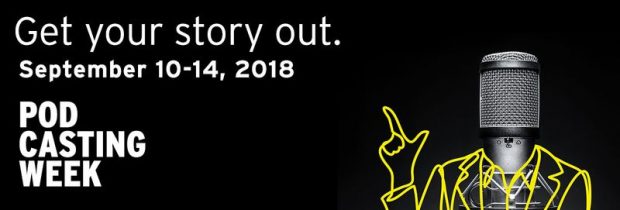
It seems like podcasts are taking over.
You can find any type of podcast you like on Apple itunes or other podcast directories, from public radio shows like “This American Life” and “Serial,” to comedy podcasts like “WTF” and “The Joe Rogan Experience” and entrepreneur programs like “The Dave Ramsey Show” or “The Tim Ferriss Show.”
Podcasts are informative, entertaining and enlightening. They offer hosts a chance to connect with their audiences, build valuable connections, make money selling advertisements and products/services and promote their brands.
In 2017, podcasts became hugely popular. According to Edison Research and Convince & Convert, 112 Americans have tuned into a podcast, which is an 11 percent increase since 2016. New podcast and podcast episodes seem to be springing up overnight.
In addition, 67 million Americans age 12 and older will listen to a podcast on a monthly basis, and 15 percent of the U.S. population will tune in weekly. Podcast devotees will listen to five shows per week, and 85 percent of listeners will hear all, or at least most of, each episode.
If you are an entrepreneur or solopreneur, you may want to start a new podcast in 2018 to build up your business. It can offer you many new opportunities as long as you do it right.
Take the following step-by-step guide from successful podcasters before you determine if you should start a podcast.
Procure the right equipment and editing software
When you start a podcast, you’ll need to have top-notch audio quality, or else people will swiftly tune out, no matter how awesome the content is. According to Kris Gilbertson, CreativeLive teacher and host of the podcast “The Lifestyle Entrepreneur,” you can do a podcast with little money or invest in some more professional equipment and editing software.
You can use the internal microphone on your computer, your iPhone, iPad or a headset to record your shows and Skype or Google Hangouts to record long-distance interviews. Gilbertson uses a Heil PR40 microphone, but it needs to be plugged into a mixer. You can plug the RODE microphone into your computer via USB or utilize the Blue Yeti, another USB microphone for about $100. Editing software, (whether it’s Adobe Audition or Audacity), will also help increase your audio file’s sound quality to the podcast listener. Garageband is another good option for post-processing and is pre-installed on most Macs.
Another thing to consider is a good hosting service — Libsyn and Soundcloud are both good options.
Learn the secrets of podcasting success from the master of the form. Learn more from Tim Ferriss.
Evoke great information and emotions from interviewees
Many podcasts will feature hosts or co-hosts interviewing other experts in their niche. If you do this, you will learn more about your industry as well as tap into your guests’ audiences. For example, if you interview an influencer with hundreds of thousands of followers, you will attract this audience when you promote the interview.
CreativeLive teacher Alex Blumberg, the CEO and co-founder of podcast network Gimlet Media, says your interview questions should encourage your interviewees to tell stories or get emotional. You should avoid “yes” or “no” questions, and instead prompt them with statements like, “Tell me about the time when…” and “Tell me the story of…” Forget making tons of small talk, and start pretty soon into your meeting with the questions you want to ask.
Check out one of our top-selling podcasting courses – Power Your Podcast with Storytelling with Alex Blumberg
Focus on great content, not the money
Unless you’ve already built a huge brand and name for yourself, you are not going to get podcast sponsors right from the beginning. During the first few months or even year of your podcast, do not fixate on how to find sponsors and make it profitable. Instead, make sure you are only putting out high-quality content during this time, says CreativeLive teacher and author of “The 4-Hour Workweek” Tim Ferriss.
In a blog post, Ferriss writes, “Option A: you can waste 30-50% of your time to persuade a few small sponsors to commit early and stall at 30,000 downloads per episode because you’re neglecting creative. Option B: you can play the long game, wait 6-12 months until you have a critical mass, then you get to 300,000 downloads per [episode] and make 10x+ per [episode] with much larger brands.”
Ferriss says it’s much better to look at the big picture instead of rushing to make money. “Haste makes waste; in this case, it can make the difference between $50,000 per year and $1,000,000+ per year. To reiterate a phrase more often used for blogging: ‘Good content is the best SEO.’” It might sound obvious, but make sure each new episode is something you would like to listen to.
Learn the secrets of podcasting success from the master of the form. Learn more from Tim Ferriss.
Find sponsors when you are ready
Once you’ve been operating for a year or you’ve built up your audience, you can then start to approach sponsors. Lewis Howes, host of The School of Greatness podcast and CreativeLive teacher, says you should look at audience comments on your show via social media.
By tracking your podcast listeners, Howes says you will “have a better idea of what kinds of sponsors will appeal to your audience, what kind of affiliate products they would buy, and where to start reaching out for opportunities with confidence that your audience is primed to buy from a brand you recommend.”
Remember, also, to have fun with your podcast. If you are not having a blast, your audience and your sponsors will be able to tell. Howes says, “Do it because you love it, pay attention to the feedback, and stay true to your intention and the opportunities for making money from your podcast will appear.”





